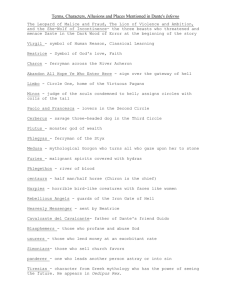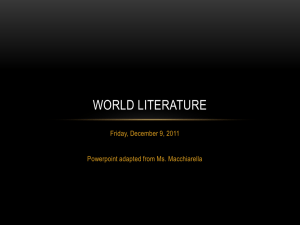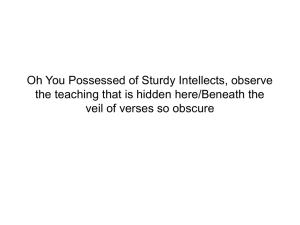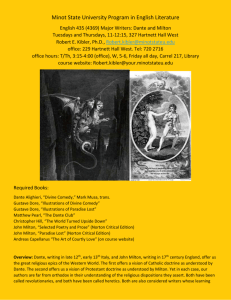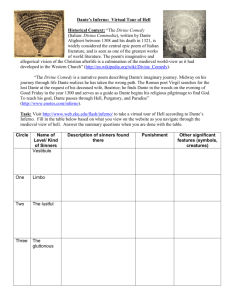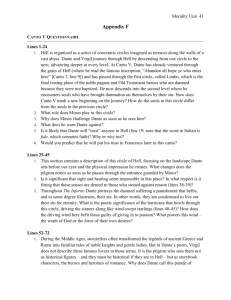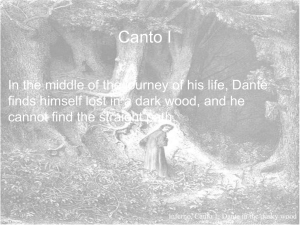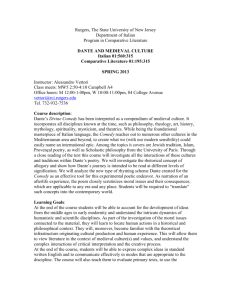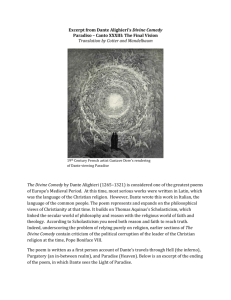Then we emerged to see – once more – the stars. Dante's
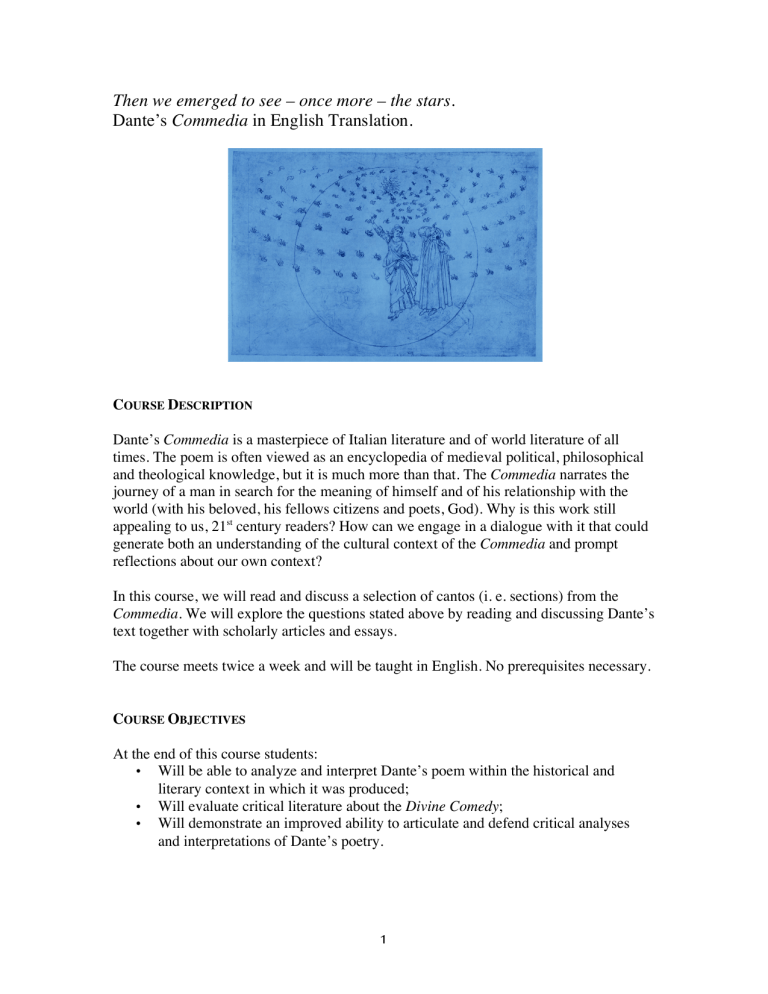
Then we emerged to see – once more – the stars.
Dante’s Commedia in English Translation.
C OURSE D ESCRIPTION
Dante’s Commedia is a masterpiece of Italian literature and of world literature of all times. The poem is often viewed as an encyclopedia of medieval political, philosophical and theological knowledge, but it is much more than that. The Commedia narrates the journey of a man in search for the meaning of himself and of his relationship with the world (with his beloved, his fellows citizens and poets, God). Why is this work still appealing to us, 21 st century readers? How can we engage in a dialogue with it that could generate both an understanding of the cultural context of the Commedia and prompt reflections about our own context?
In this course, we will read and discuss a selection of cantos (i. e. sections) from the
Commedia . We will explore the questions stated above by reading and discussing Dante’s text together with scholarly articles and essays.
The course meets twice a week and will be taught in English. No prerequisites necessary.
C OURSE O BJECTIVES
At the end of this course students:
• Will be able to analyze and interpret Dante’s poem within the historical and
•
• literary context in which it was produced;
Will evaluate critical literature about the Divine Comedy ;
Will demonstrate an improved ability to articulate and defend critical analyses and interpretations of Dante’s poetry.
1
R EQUIRED T EXTS
The Divine Comedy of Dante Alighieri , edited by R. M. Durling and R. L. Martinez.
Three volumes ( Inferno , Purgatorio , and Paradiso ).
Additional reading material will be provided throughout the course (via email or through course website).
A SSIGNMENTS AND G RADING
Participation
Short Paper
Presentation
Final Paper Proposal
Final Paper Draft
30%
10%
10%
10%
20%
Final Paper 30%
___________________________
100%
Participation
This is a discussion-based course, therefore participation is a crucial component of your final grade. It is important that you come to class prepared, which means having done the readings and being ready to participate actively in the discussion. You will be required to submit a discussion question before each class, which also counts towards of your participation grade.
Short Paper
This is a 3-5 page close reading of a passage from the Commedia , which will be of your choice but previously discussed with me at least a week in advance. The paper is due at the end of the third week. Further guidelines will be provided in due time. Papers receiving less than a B may be rewritten.
Presentation
This is a 10-15 minute individual presentation. You will be responsible for one canto, summarizing its the main points and preparing questions to initiate the discussion. It is important that you don’t only summarize the readings, but that you underline the ways in which they can be put in dialogue. Presentations will begin in the fourth week of the semester
Final Paper
This is an 8-10 page essay, in which you will either analyze a specific canto or group of cantos, or focus on a specific theme and on the passages which are relevant to it. There are three steps to this assignment: a paper proposal, a first draft, and the final paper.
2
The paper proposal is a brief description of your project (~300 words), in which you explain the issues that you will address in you paper and the way in which you will do it.
A preliminary bibliography will be part of this proposal. It is important to remember that this proposal will not be a binding contract, and that you will have the opportunity to change your topic for the first draft, if you realize that the first one you had picked doesn’t work.
Specific guidelines for the first and final draft will be handed out during the semester.
O NLINE R ESOURCES
Here is a list of the most important resources available online, which you might find helpful for your presentation and essays. Everyone is encouraged to take advantage of them. And obviously, everyone is welcome to browse for more online resources and expand the list!
• Dartmouth Dante Project – a searchable full-text database containing more than seventy commentaries on Dante's Divine Comedy : http://dante.dartmouth.edu
• Dante Online – a searchable database of all works by Dante (in the Italian or
Latin original and in the English translation), which includes a list of all the manuscripts of the Comedy : http://www.danteonline.it/english/home_ita.asp
• Princeton Dante Project – offers a series of resources including online lectures on various topics and a list of web resources related to Dante: http://etcweb.princeton.edu/dante/pdp/
• Renaissance Dante in Print – an online exhibition of Renaissance editions of the
Comedy from the Dante Collection at the University of Notre Dame and from the
Newberry Library of Chicago - http://www.italnet.nd.edu/Dante/index.html
• The World of Dante – a multi-media research tool aimed at an interactive study of the Comedy , especially useful for the visual arts: http://www.worldofdante.org
A CADEMIC H ONESTY & C OURSE P OLICIES
Students are expected to know the Brown’s Academic Code and abide to it. You can find it online at: http://www.brown.edu/academics/college/degree/sites/brown.edu.academics.college.degr
ee/files/uploads/Academic-Code.pdf
Students are allowed a maximum of three unexcused absences. For each additional absence, one point will be deducted from the final grade.
3
C
ALENDAR
Week 1 – Dante and His Times
R. M. Durling and R. L. Martinez, Introduction to Inferno (3-24)
L. Pertile, Introduction to Inferno
G. Mazzotta, Why Did Dante Write the Comedy ? Why and How Do We Read It?
Week 2 – The Journey Begins
Inferno , cantos 1-3
Durling and Martinez, Additional Note 1 (551-552)
Inferno , canto 5
G. Boccaccio, Expositions on Dante’s Comedy, chapter 10-11 (excerpts)
Week 3 – Woods, Words, and Eternity
Inferno , canto 10
Auerbach, Farinata and Cavalcanti
Inferno , cantos 13 and 15
Additional Notes 4 and 5 (557-560)
Spitzer, Speech and Language
**S HORT P APER D UE **
Week 4 – Ulysses’ Mad Flight and the Power of Words
Inferno , canto 26
Additional Note 11 (571-573)
J. L. Borges, The Last Voyage of Ulysses
Inferno , canto 28
**P RESENTATIONS B EGIN **
4
Week 5 – Through the Glacial Pit of Hell
Inferno , cantos 32-33
J. L. Borges, The False Problem of Ugolino
Inferno , canto 34
Additional Note 16 (580-583)
Week 6 – The Ascent of Mount Purgatory
Purgatorio , cantos 1-3
Durling and Martinez, Introduction to Purgatorio (3-16)
Additional Notes 1-2 (591-594)
Purgatorio , canto 6
Week 7 – Visual Purgation
Purgatorio , cantos 10
N. J. Vickers, Seeing is Believing: Gregory, Trajan, and Dante’s Art
Purgatorio, cantos 12
Additional Notes 6-8 (603-610)
Week 8 – Love and the Structure of Dante’s Afterworld
Purgatorio , canto 17
Purgatorio , 20-22 (Statius)
K. Brownlee, Dante and the Classical Poets
Week 9 – Dante’s Poets and the poets’ Dante – Excursus on the Reception of Dante
T. S. Eliot, The Waste Land , lines 60-76
T. S. Eliot, What Dante Means to Me
O. Mandelstam, Conversation about Dante (excerpts)
W. B. Yeats, A Vision (excerpts)
W. B. Yeats, Ego Dominus Tuus
**P APER P ROPOSAL D UE **
5
Week 10 – The Earthly Paradise
Purgatorio , cantos 30-31
Purgatorio , cantos 32-33
C. S. Singleton, Dante Studies II (excerpts)
Week 11 – Beatrice
Paradiso , canto 1
Durling and Martinez, Introduction to Paradiso
Paradiso , cantos 2-3
Dante, Vita Nuova (The New Life), chapter 1-3 and 42
Additional Note 1 (695-702)
Week 12 – The Political Dante
Paradiso , canto 6
Week 13 – Francis and Dominic
Paradiso , cantos 11-12
Paradiso , cantos 14-18 (selection)
**F IRST D RAFT OF P APER D UE **
Week 14 – The Celestial Rose
Paradiso , cantos 32-33
Final class and wrap up
Week 15 – (No Class) - Individual Conferences with Instructor
**F INAL P APER DUE **
6
